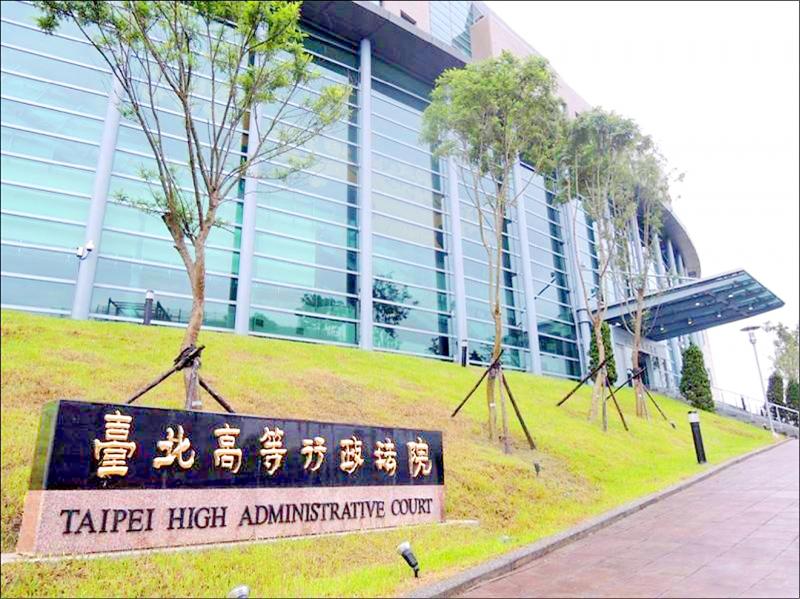The Taipei High Administrative Court on Thursday ruled in favor of a transgender woman in mandating that a household registration office in Taoyuan process her request to be registered as female.
The plaintiff, surnamed Chiang (江), filed with the Dasi Household Registration Office in October 2019 to change her registered gender from male to female, but the office denied the request.
It cited a Ministry of the Interior notice that said that Chiang failed to meet two prerequisites to change her gender: be diagnosed by two psychiatrists as identifying with the gender to which they wish to change and undergo surgery to remove genitalia of their birth gender.

Photo: Wu Cheng-feng, Taipei Times
Chiang had not undergone such surgery, the office said.
However, the court said that Chiang provided a diagnosis from two psychiatrists that she identified as female, which demonstrates that she is cognizant and understands her choice, adding that her decision should be upheld and protected by law.
The court ruling said that in accordance with previous Council of Grand Justices interpretations, the rights of personality, health, privacy and body are all protected by the Constitution.
Under the Constitution, the law must uphold the dignity of all people, and afford them the rights to determine their gender and the freedom to develop their character and personality, the court said.
The ministry’s notice contravened the Constitution, as a person’s gender should not be made immutable because of the genitalia they are born with, and they should be allowed to decide their gender, the court said.
Citing the death of Yeh Yung-chih (葉永鋕) as a precedent, the court said that the government should not stop at measures to direct social attention toward the issue or the establishment of gender equality legislation, but should instead offer constitutional protection of every person’s freedom to decide their gender.
Yeh, a high-school senior who had been bullied by classmates due to his perceived effeminate behavior, died on April 21, 2000. He was found lying in a pool of blood on the floor of a school bathroom.
Authorities at the time ruled out foul play. Although the cause of death had not been due to external injuries, Yeh’s death nonetheless prompted Taiwanese society to review gender equality regulations in schools.
The court recommended that the legislature pass new legislation to ensure that the right to gender identification is protected, as the ministry directive could be applied by other household registration offices when dealing with similar cases in the future.
The ruling can be appealed.
The Taiwan Alliance to Promote Civil Partnership Rights, a group that promotes gender equality, on Friday said that the ruling is unprecedented, and it urged the Taoyuan City Government not to file an appeal.
Additional reporting by CNA

Alain Robert, known as the "French Spider-Man," praised Alex Honnold as exceptionally well-prepared after the US climber completed a free solo ascent of Taipei 101 yesterday. Robert said Honnold's ascent of the 508m-tall skyscraper in just more than one-and-a-half hours without using safety ropes or equipment was a remarkable achievement. "This is my life," he said in an interview conducted in French, adding that he liked the feeling of being "on the edge of danger." The 63-year-old Frenchman climbed Taipei 101 using ropes in December 2004, taking about four hours to reach the top. On a one-to-10 scale of difficulty, Robert said Taipei 101

Nipah virus infection is to be officially listed as a category 5 notifiable infectious disease in Taiwan in March, while clinical treatment guidelines are being formulated, the Centers for Disease Control (CDC) said yesterday. With Nipah infections being reported in other countries and considering its relatively high fatality rate, the centers on Jan. 16 announced that it would be listed as a notifiable infectious disease to bolster the nation’s systematic early warning system and increase public awareness, the CDC said. Bangladesh reported four fatal cases last year in separate districts, with three linked to raw date palm sap consumption, CDC Epidemic Intelligence

Two Taiwanese prosecutors were questioned by Chinese security personnel at their hotel during a trip to China’s Henan Province this month, the Mainland Affairs Council (MAC) said yesterday. The officers had personal information on the prosecutors, including “when they were assigned to their posts, their work locations and job titles,” MAC Deputy Minister and spokesman Liang Wen-chieh (梁文傑) said. On top of asking about their agencies and positions, the officers also questioned the prosecutors about the Cross-Strait Joint Crime-Fighting and Judicial Mutual Assistance Agreement, a pact that serves as the framework for Taiwan-China cooperation on combating crime and providing judicial assistance, Liang

US climber Alex Honnold left Taiwan this morning a day after completing a free-solo ascent of Taipei 101, a feat that drew cheers from onlookers and gained widespread international attention. Honnold yesterday scaled the 101-story skyscraper without a rope or safety harness. The climb — the highest urban free-solo ascent ever attempted — took just more than 90 minutes and was streamed live on Netflix. It was covered by major international news outlets including CNN, the New York Times, the Guardian and the Wall Street Journal. As Honnold prepared to leave Taiwan today, he attracted a crowd when he and his wife, Sanni,